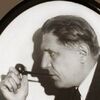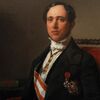
I want you, poets, with troubled hearts: / wish, dream and laugh, cry. May nature / reflect in you the immensity / of its varied composition. / And let your souls be tried / by as many passions as possible. Let happiness, / pain and anger and love / bubble up in you mixed. / As the cloud is charged with lightning, / so may your soul be charged with the longing / to elevate your word through acquaintances, - / so that in harmonies you may embody its excess, / glorifying a single paradise: The wind... / Having only one God: the Beautiful.

It is not the poetry that we have read, but that to which we return with the greatest pleasure that has the genuine force and deserves the name of major poetry.

If by Moral we understand the guidance of the will by reason, and, on the other hand, an understanding of life, we cannot remove the conclusion that the Beautiful is a part of the Good, its dynamic and constructive part. Reason alone can do nothing…
Morality is not necessary Struggle, it can mean understanding, harmony, enlightenment, self-building...
Art and morality address different goals and use different means, one the ethical sense, the other the sense of the Beautiful - but their paths are not parallel, but intersect and largely coincide...
If the artist or contemplator is not conscious not only that he is obeying aesthetic taste and the imperative to create externally or internally, but that in doing so he is also performing an ethical act, his manifestation will be minor and more perishable than otherwise...
Also, the moral man who does not have the consciousness of the beauty of his experience or who does not satisfy, together with his rational sense of duty, and his sensibility or imagination, appears to us far from the desired perfection...

In believing, we are ourselves and express, in real terms, our metaphysical power to enrich reality. Art is participation in the totality of nature, because it immediately relates or connects the human spirit with the ever-enriching totality or whole...
In the monadic perspective, art is an essential completeness. It is the very experience that the monad or individual expresses to itself and for itself. It is imaginative spirituality, or, in other words, the manifestation of mission or formative instinct, which lasts as long as this mysterious movement which is human life lasts.
From Baudelaire to the present day, poetry not only did not become silent, but went towards the essences, towards hidden sources that the creators of the happy auroral age of the lyrical myth did not even suspect. And since then, poets and thinkers have glossed over the essence of lyricism, to the point of subtlety...
There has been so much glossing over the concept of poetry that a metaphysics of lyricism has been reached, and even an identification of metaphysics with lyricism.
We know, however, that great poetry, at its extreme limit, borders on metaphysics, but does not overlap, does not identify metaphysics; sensitivity is the living source of lyricism, human experience, deep, pathetic...
Eminescu experienced the intuition of death and the vanity of love, and if his superb scream reached the upper limit of lyricism, the ceiling of metaphysics, it did not sterilize the emotion at all; ... After him, Tudor Arghezi, in another sense, relived the same experience and found the pure springs of poetry, without freezing them under the cold breath of intelligence; ... After both, an authentic metaphysician, like Lucian Blaga, clearly feeling the boundaries between philosophy and poetry, without overlapping them, lived the experience of the drama of the mystery in substantial verses ...
But poetry dies, among other things, slowly intoxicated by metaphysics; it suffocates itself by hermeticism, it sterilizes itself by intelligence, it commits suicide by the confusion that it must identify itself with an act of knowledge, forgetting that in essence it is song, it is naked sensibility, it is screaming, it is itself, and it cannot be substituted either metaphysics, nor science, nor any other speculative field...
It could be said, in certain cases, that the expression in poetry was invented to hide the feeling, and I do not immediately think of what has been called hermeticism in the modern lyric, for hermeticism is not only a formal attitude, which would assume that the expression would lock the void. In this case, it would simply be a farce, an external game, without substance...
Hermeticism is the expression of a structure, the approximation of some essences, which cannot be captured by common language. Hermetic is also the lyric of Ion Barbu and the lyric of Lucian Blaga; of special essences, their final hermeticism corresponds to special structures.
The reader of modern poetry, when he himself is not an initiate and an aficionado, quickly gets disorientated, between so many ways, fashions, trends, currents and subcurrents, in which lyricism has complicated, refined if not rarefied the means of expression, beyond all his inherited and perpetuated habits, through a limited literary education... Faced with so many impediments, he summarily concludes that, from a certain limit, there is no more poetry, that the world mocks him, with innocence or perversity, and that it no longer has any criterion to distinguish between what is and what is not lyrical art.
Any aesthetic act closes a psychological act. It is easier to reach the "aesthetic universe" through the "moral universe".
The most troubling problem of a writer's consciousness is the problem of survival; it is not a question of the greater or lesser place he will occupy in the history of culture and literature after death, but of those achievements which will become permanent values, to which all successive generations can form and bow.

An artist, in order to succeed, needs only one protector: talent.
Poetry... the intimate soul of man, divine thought, bridge that everyone can cross into the world of dreams, the music that every man carries with him.

Classicism-Romanticism ... The muse of classicism, for the romantics, is a muse that does not get its colors from the sun, nor its inspiration from the heavens: a muse whose spirits have robbed her of spontaneity, beauty and youth...
As inspiration does not descend from heaven, it is not strong enough to rule the earth, therefore, according to the romantics, the ephemeral flowers that made up its crown, and which in one day they lost their hues, luster and fragrance…
Classical poetry, considered by the romantics under an artistic aspect, is the abdication of genius fettered in the chains of art; considered from a moral aspect, it hinders the development of the grandest passions; considered politically, it tends to humble the noble pride of poets before the pride of potentates and the vain pomp of kings; considered sub-social to suppress the movement of renewal and progress of societies... for this reason, when it is didactic, it subjugates the inspiration of perceptions; when they are lyrical, they sing of material pleasures and satisfactions, forgetting the dignity of nations; when it is epic, it seeks its characters in the aristocratic races and among the proud demigods who have left their warlike exploits to history as the remains of a feast; when it is dramatic, it delights in sketching the physiognomy of magnates and heroes...
Romantic poetry, considered by the classics, from an artistic point of view, is a rebellion against art. Considered morally, it is a rebellion against healthy morals, it is the apotheosis of crime. Considered politically, it is a rebellion against the traditional institutions of the peoples. Considered from a social aspect, it is rebellion against public authority; it is a hymn that folk muses chant on the day of their vengeance…
For this reason, when it is didactic, it suppresses the rules of good taste, created by divinity, learned by the learned and consecrated by the experience of the ages; when it is dramatic, it throws on the stage the repulsive, monstrous physiognomy, and prostitutes who pass before us can scarcely conceive of them, and prostitutes who pass before us like harlots, with lascivious eyes and a tow in hand; when lyrical, her angry and sinister inspiration rushes like thunderbolts over stunned crowds. As for the epic trumpet, it was never used by the muse of romance; the club of Hercules cannot be wielded by pygmies...
The error of the classics and the romantics always consists in an exaggerated truth when they assert something about themselves, and an incomplete truth when they assert something about their adversaries...

All creations have the character of universality which, expressing in an original way, unexplainable by mere historical filiation, a spiritual content completely in solidarity with the time, with the space and with the people in whose bosom it appeared, can respond to the demands of any era, any country, even if after the objective phenomena that caused them no longer interest us except in a documentary and historical way.

The great writers and artists of the world never remained strangers to the aspirations of their age... Viable works are the creations of artists who filled their souls with the ideas of their age...
This statement should not be seen as a dogma, claiming the writers' unconditional adherence to the prevailing guidelines of the time...